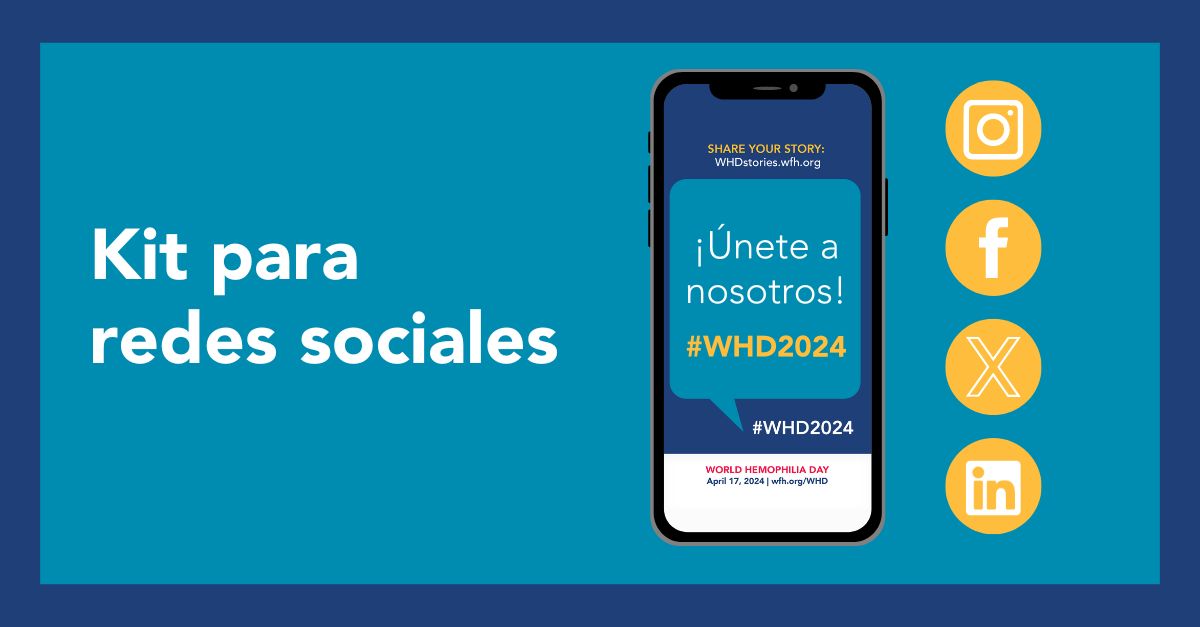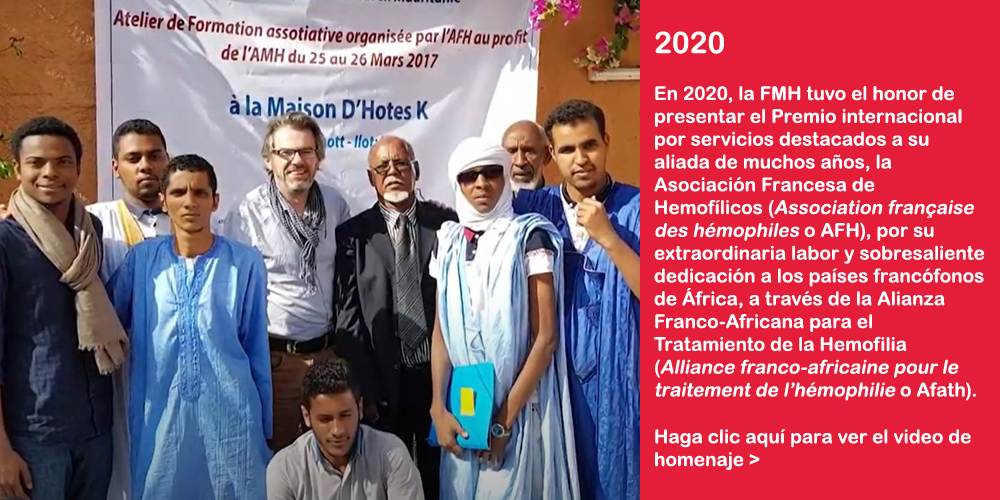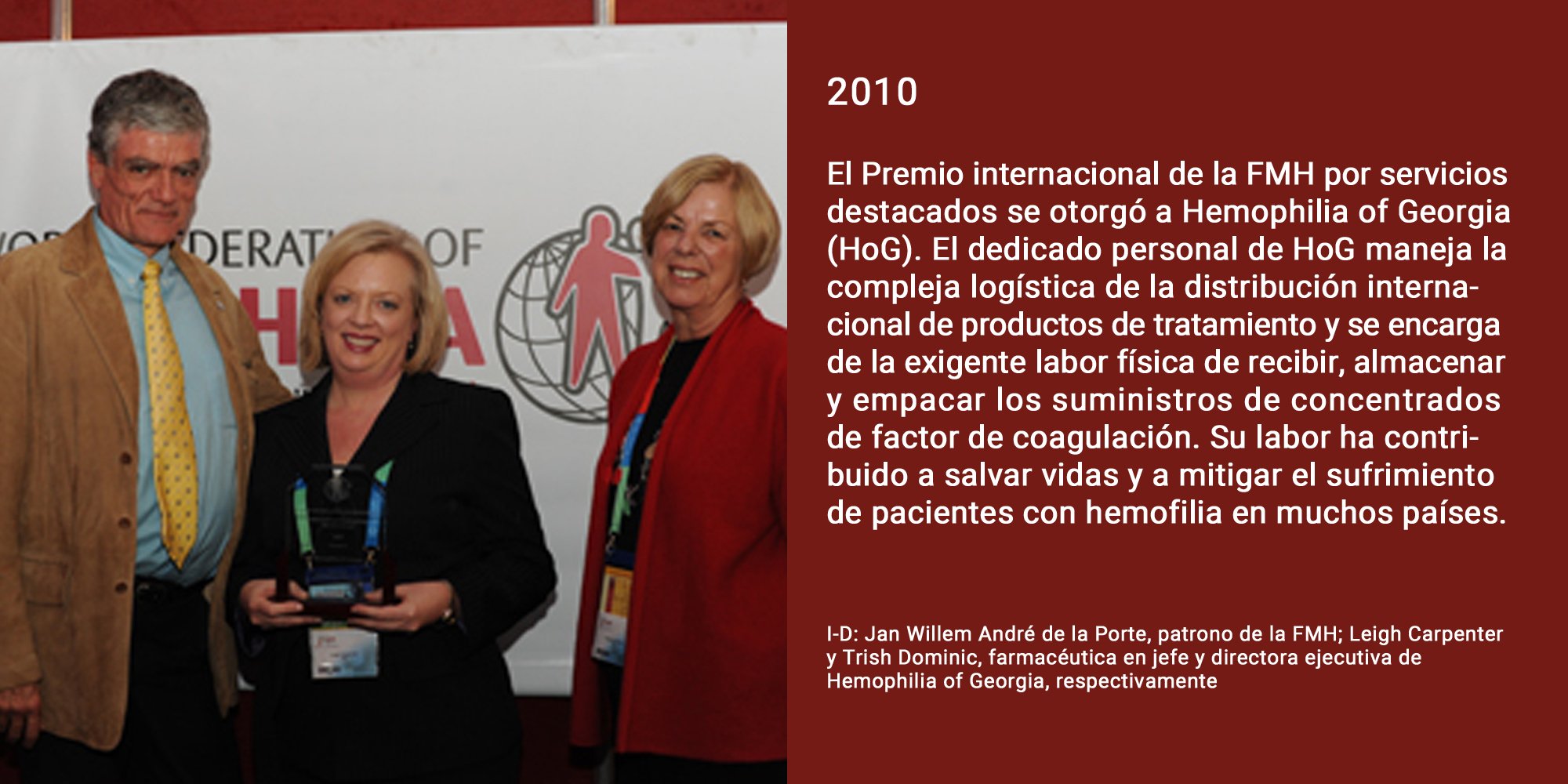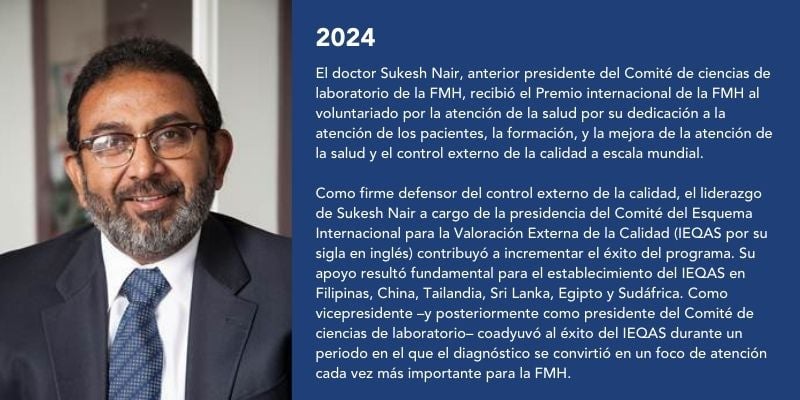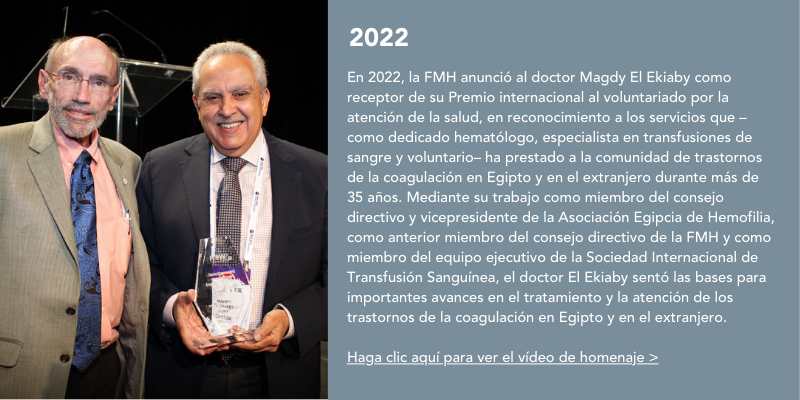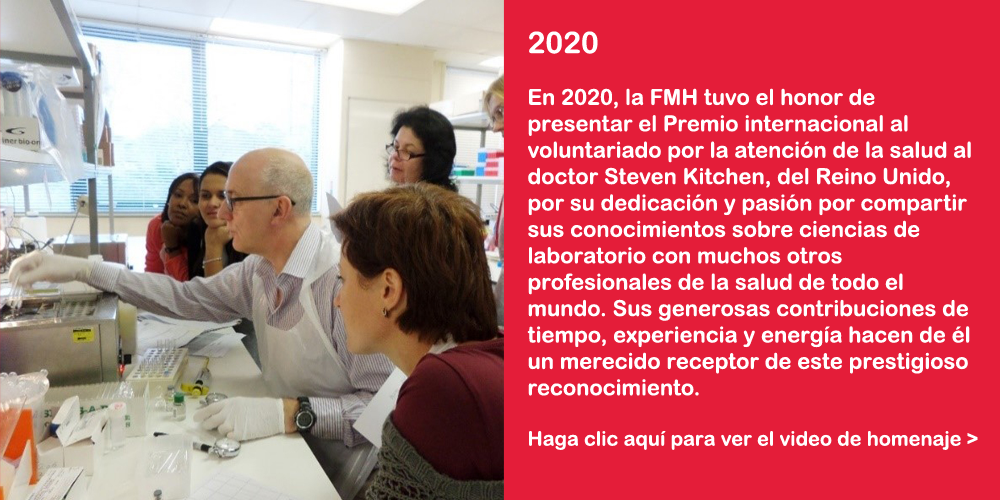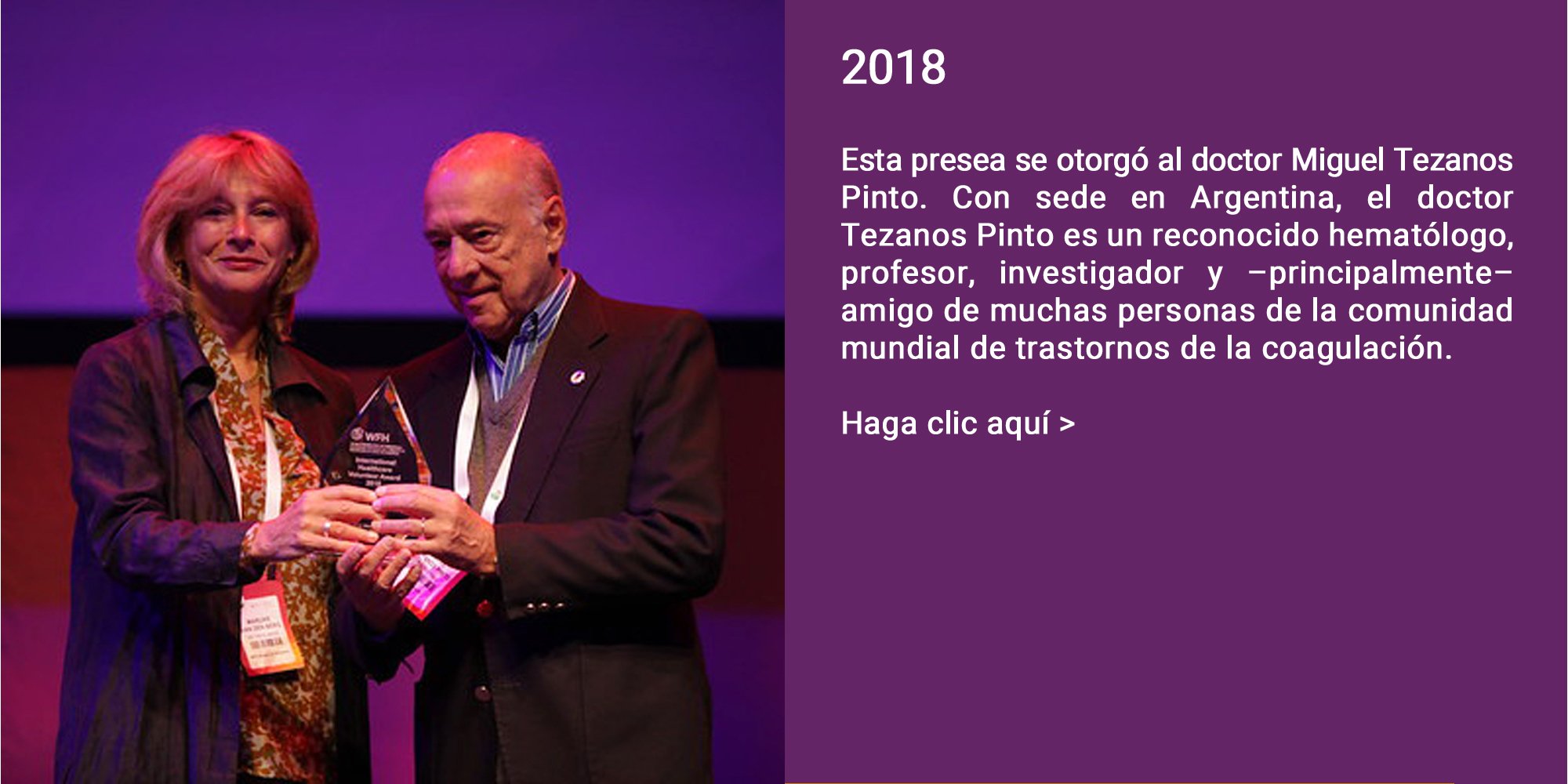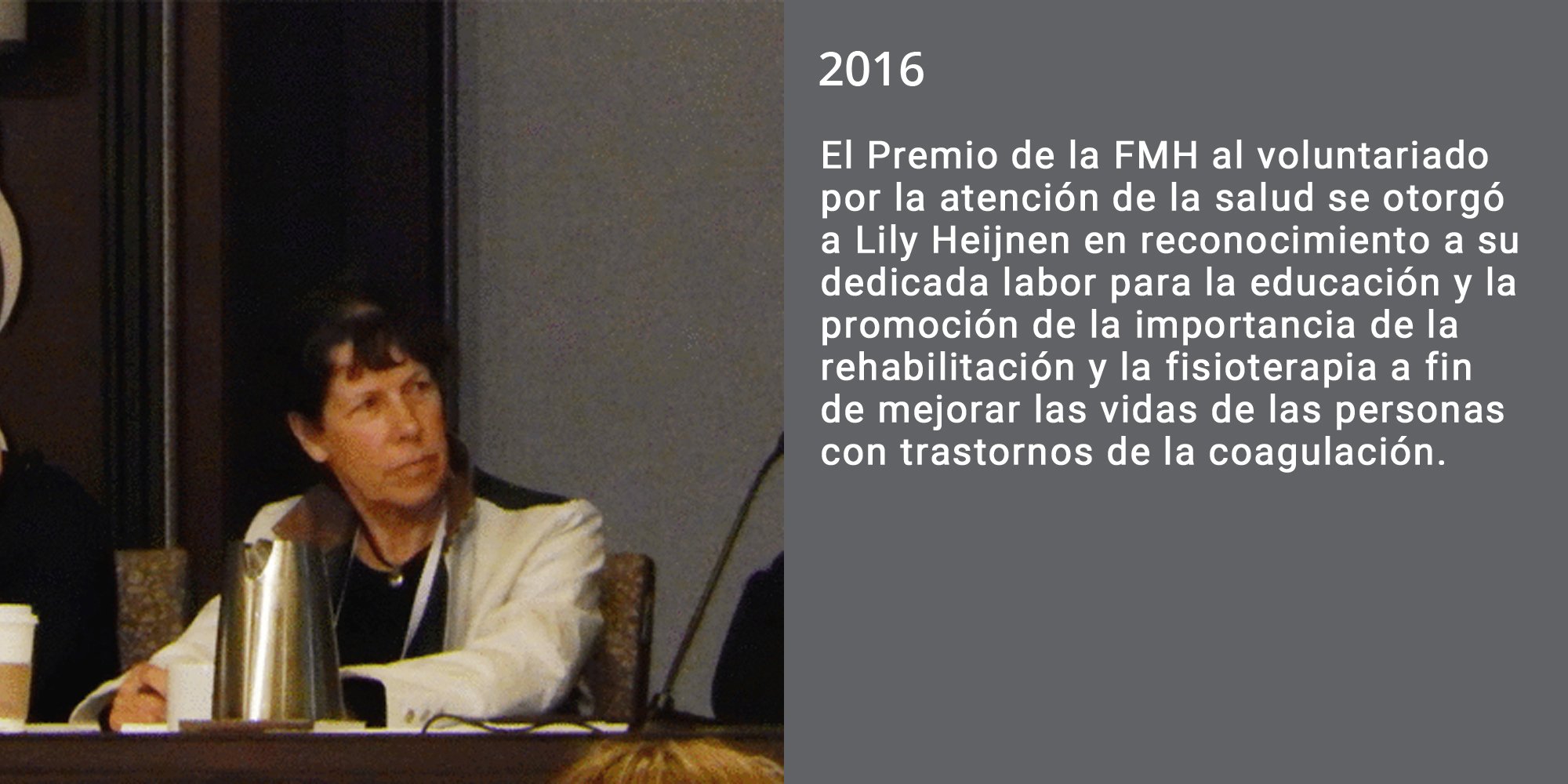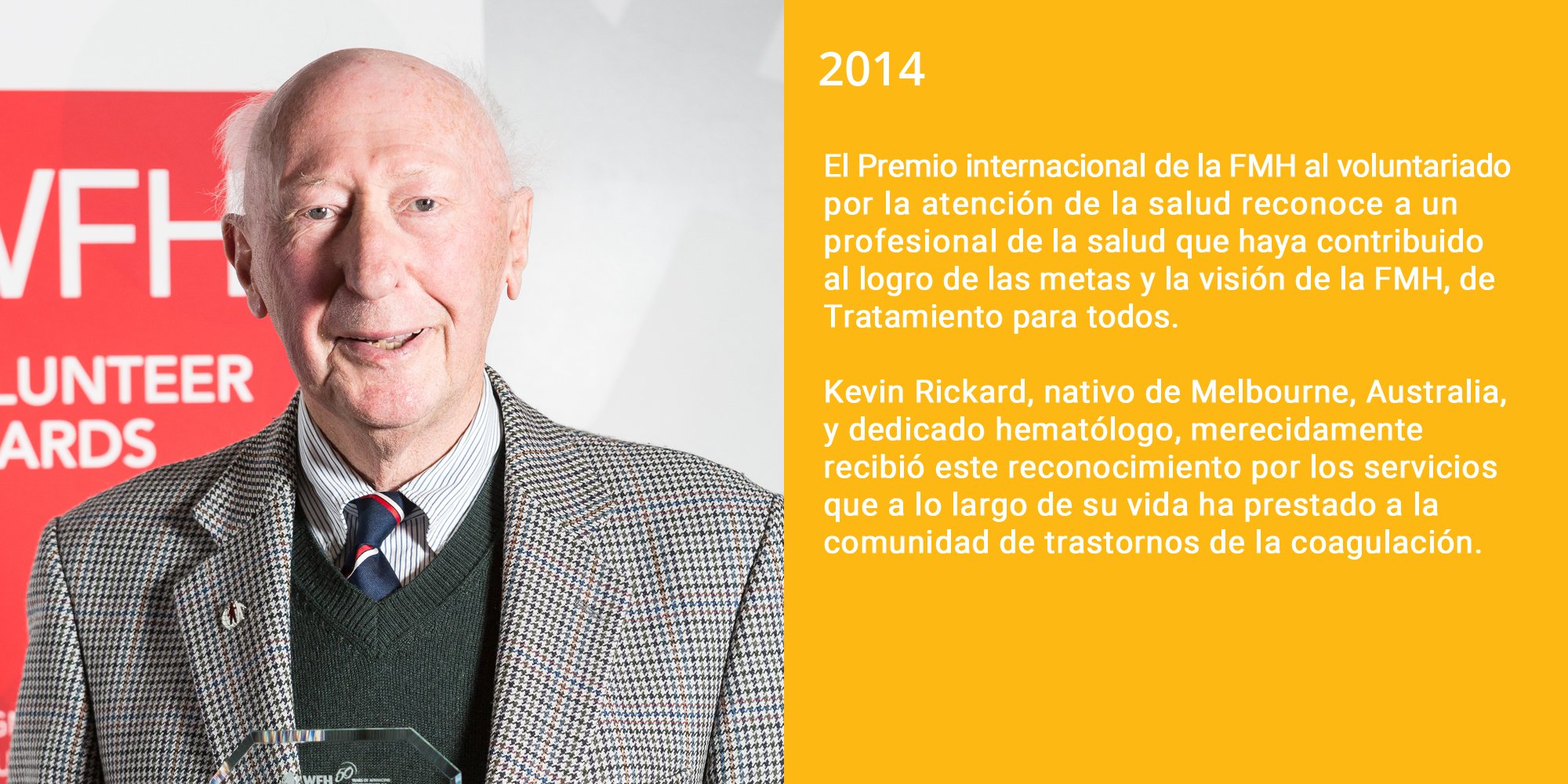¡La FMH anima a todas las personas a interactuar con la comunidad el 17 de abril y a hacer escuchar su voz! Pueden hacerlo publicando sus historias personales en nuestra página internet o en redes sociales. A continuación se ofrecen recursos del Día mundial de la hemofilia que pueden utilizarse para participar este 17 de abril.
Sírvase notar que las historias y mensajes en internet o en redes sociales no deberán incluir ninguna mención (o imágenes) de marcas de productos de tratamiento.
Acerca del Día mundial de la hemofilia
Desde 1989, cada 17 de abril, grupos de pacientes de todo el mundo celebran el Día mundial de la hemofilia a fin de generar conciencia y comprensión acerca de la hemofilia y otros trastornos de la coagulación. La fecha se eligió en honor del fundador de la FMH, Frank Schnabel, quien nació ese día.
Los objetivos del Día mundial de la hemofilia son los siguientes:
- Promover la importancia de tomar medidas coordinadas y concertadas a fin de lograr la visión de la FMH de Tratamiento para todos.
- Llamar la atención hacia temas clave y poner de relieve a la hemofilia y los trastornos de la coagulación.
Tema del 2024
El 17 de abril de 2024 se celebra el Día mundial de la hemofilia. El tema del evento de este año es Acceso equitativo para todos: Reconocemos todos los trastornos de la coagulación. La visión de la FMH de Tratamiento para todos es la de un mundo en el que todas las personas con trastornos de la coagulación hereditarios tengan acceso a la atención, sin importar su tipo de trastorno, su género, su edad o el lugar donde vivan.
Use las siguientes etiquetas en redes sociales para unirse a la conversación
- #WorldHemophiliaDay
- #WHD2024
- #LightItUpRed
Forme parte de la campaña Iluminarse de rojo
Cada año, cientos de edificaciones toman parte en la campaña Iluminarse de rojo demostrando su solidaridad con la comunidad mundial de trastornos de la coagulación. Las siguientes son algunas maneras en las que usted puede participar en esta campaña:
- Vista una prenda roja en casa y comparta una selfie en redes sociales.
- Desafíe a sus colegas o compañeros a publicar una foto de ellos(as) mismos(as) vistiendo de rojo ese día, ¡o publique un collage de todas las personas de su organización vistiendo de rojo!
- Use la etiqueta #LightItUpRed y publique en redes sociales fotos de edificaciones que vea iluminadas de rojo.
- Vea la lista completa de edificaciones que se iluminan de rojo aquí.
- Si usted supiera de alguna edificación que vaya a ¡Iluminarse de rojo! para el Día mundial de la hemofilia 2024 y que no estuviera incluida en esta lista agradeceremos que envíe la confirmación oficial de la participación de la edificación a [email protected], a fin de agregarla a la lista.
Pase la voz
Hay muchas maneras en las que usted puede pasar la voz entre su comunidad. Las siguientes son solo algunas de ellas:
- Comparta la página internet del Día mundial de la hemofilia: worldhemophiliaday.org.
- Deles un “me gusta”, comparta y reenvíe mensajes relacionados con el Día mundial de la hemofilia publicados en redes sociales.
- Comparta el poster oficial del Día mundial de la hemofilia (haga clic en “Materiales de la campaña”).
- Comparta nuestros materiales para el Día mundial de la hemofilia en su página internet o a través de redes sociales.
- Comparta la página de historias del Día mundial de la hemofilia, ¡que ya está recibiendo videos!
Ejemplos de mensajes en redes sociales
Los siguientes son algunos mensajes para redes sociales que usted puede utilizar en sus propias campañas:
- ¡El Día mundial de la hemofilia #WorldHemophiliaDay es el 17 de abril! ¡Aprenda más sobre este histórico día en wfh.org/WHD y descargue su propio poster #WHD2024!
- El Día mundial de la hemofilia #WorldHemophiliaDay es para celebrar a la comunidad de trastornos de la coagulación. Reenvíe/comparta este mensaje si alguien en su familia vive con un trastorno de la coagulación #bleedingdisorders #WHD2024.
- ¡Marque su calendario! El 17 de abril es el Día mundial de la hemofilia #WorldHemophiliaDay. ¿Cómo lo celebrará? Yo celebraré…
- El Día mundial de la hemofilia #WHD2024 es un día para que todos aprendamos más sobre los trastornos de la coagulación #BleedingDisorders. Únase al movimiento y aprenda más sobre la hemofilia #hemophilia en la Plataforma de aprendizaje electrónico de la FMH: wfh.org/es/instruccion-y-aprendizaje-electronico/.
- ¡Este Día mundial de la hemofilia #WorldHemophiliaDay comparta SU historia! Suba su historia o mensaje de video a nuestra página de historias aquí: worldhemophiliaday.org #WHD2024.
- ¡Ya solo faltan unas cuantas semanas para el Día mundial de la hemofilia #WorldHemophiliaDay! Este año, nuestra comunidad se reúne en torno al tema “Acceso equitativo para todos: Reconocemos todos los trastornos de la coagulación” #WHD2024. Compartimos nuestras historias sobre la labor de la comunidad a fin de lograr la participación de nuestro gobierno. Comparta su historia en: worldhemophiliaday.org.
- ¡Este Día mundial de la hemofilia #WorldHemophiliaDay comparta su historia! La FMH ha marcado una enorme diferencia en las vidas de los niños en India llevándoles esperanza. Vea el video aquí: https://youtu.be/S96MOzW2CEA #hemophilia.
- ¿Cómo logra que su gobierno participe? ¡Comparta su historia #WHD2024! En Nepal, el Programa de Ayuda Humanitaria de la FMH ha desempeñado un papel esencial para ayudar a la Sociedad de Hemofilia de Nepal a abogar eficazmente ante múltiples niveles de gobierno. Lea la historia: wfh.org/es/article/el-programa-de-ayuda-humanitaria-de-la-fmh-apoya-actividades-de-cabildeo-de-su-onm-nepalesa/.
- ¡Llegó! Hoy es el Día mundial de la hemofilia #WorldHemophiliaDay: ¡Un día dedicado a celebrar a nuestra comunidad en todo el mundo! Compartimos nuestra historia con la comunidad y usted también puede hacerlo en: wfh.org/whd.
El kit de herramientas de cabildeo
Hay muchas maneras en las que usted puede llamar la atención hacia la hemofilia y otros trastornos de la coagulación hereditarios entre su comunidad local y mundial, con el propósito de crear conciencia sobre la necesidad de su inclusión en las políticas nacionales de salud. Este artículo cubre muchas de estas maneras, pero también puede obtener más información usando el Kit de herramientas de cabildeo del Día mundial de la hemofilia. Esta útil guía le mostrará la mejor manera de usar las redes sociales, cómo organizar un evento, cómo tomar medidas a escala local, ¡y más! Descárguela aquí (haga clic en “Kit de herramientas de cabildeo”).
Envíe una carta a un funcionario gubernamental
Una manera de ayudar a marcar la diferencia este Día mundial de la hemofilia es comunicarse con funcionario gubernamentales y legisladores por medio de una carta. Una breve nota personal de alguien de la comunidad a menudo puede ser el primer paso de una trayectoria que podría resultar en un cambio importante. La FMH ofrece un ejemplo de carta que usted puede adaptar a sus necesidades. La carta abarca todo lo que usted necesita saber; por ejemplo, lo siguiente:
- Iniciar la carta con un saludo formal.
- Explicar el propósito de su carta.
- Explicar sus preocupaciones relativas a los trastornos de la coagulación hereditarios.
- Utilizar historias y ejemplos personales o relevantes.
- Reconocer apoyos anteriores.
- Describir las medidas que usted espera que tome el funcionario.
- Proponer la manera en la que su organización puede ayudar.
Puede descargar el ejemplo de carta aquí (haga clic en “Kit de herramientas de cabildeo”) y adaptarlo a sus necesidades.
¡Descargue todo lo que necesita para llenar sus espacios con contenido e historias del Día mundial de la hemofilia! Las siguientes imágenes y materiales para compartir están disponibles en inglés, francés y español:
- Poster
- Banner para página internet
- Gráfico para firma de correo electrónico
- Hoja informativa sobre “Cómo participar”
- Modelo de carta para la campaña “Iluminarse de rojo”
- Kit de herramientas de cabildeo que describe otras maneras de participar
- Plantillas gráficas para Instagram
- Fotos y gráficos para redes sociales
- Fondo para Zoom
- ¡Y más!
Descargue gratuitamente estos recursos aquí.
¡Cuéntenos lo que está planeando!
¡Queremos apoyarle y ayudarle a amplificar sus esfuerzos! Cuéntenos lo que ha hecho o lo que está planeando hacer para el 17 de abril. Son bienvenidas historias, imágenes o mensajes en redes sociales. Sírvase notar que estas historias y mensajes no deberán incluir ninguna mención (o imágenes) de marcas de productos de tratamiento. No dude en compartir sus eventos con el departamento de comunicaciones y mercadotecnia de la FMH escribiendo a mailto:[email protected].
La FMH desea agradecer el apoyo continuo de sus patrocinadores del Día mundial de la hemofilia 2024: Bayer, BioMarin Pharmaceutical Inc., Biotest, CSL Behring, F. Hoffman-La Roche Ltd., GC Pharma, Grifols, Kedrion, LFB S. A., Novo Nordisk, Octapharma, Pfizer, Sanofi, Sobi, Spark Therapeutics, y Takeda.

